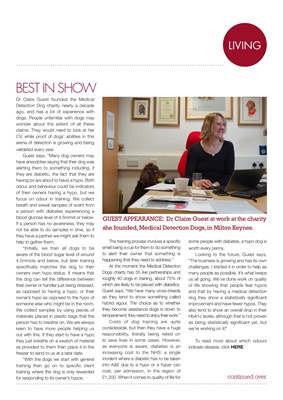
KITLIVING
Dr Claire Guest founded the Medical
Detection Dog charity nearly a decade
ago, and has a lot of experience with
dogs. People unfamiliar with dogs may
wonder about the extent of all these
claims. They would need to look at her
CV, while proof of dogs' abilities in this
arena of detection is growing and being
validated every year.
Guest says, "Many dog owners may
have anecdotes saying that their dog was
alerting them to something including, if
they are diabetic, the fact that they are
having (or are about to have) a hypo. Both
odour and behaviour could be indicators
of their owners having a hypo, but we
focus on odour in training. We collect
breath and sweat samples of scent from
a person with diabetes experiencing a
blood glucose level of 4.5mmol or below.
If a person has no awareness, they may
not be able to do samples in time, so if
they have a partner we might ask them to
help to gather them.
"Initially, we train all dogs to be
aware of the blood sugar level of around
4.5mmols and below, but later training
specifically matches the dog to their
owners own hypo status. It means that
the dog can tell the difference between
their owner or handler just being stressed,
as opposed to having a hypo, or their
owner's hypo as opposed to the hypo of
someone else who might be in the room.
We collect samples by using pieces of
materials placed in plastic bags that the
person has to breathe on. We are always
keen to have more people helping us
out with this. If they start to have a hypo
they just breathe on a swatch of material
as provided to them then place it in the
freezer to send to us at a later date.
"With the dogs we start with general
training then go on to specific client
training where the dog is only rewarded
for responding to its owner's hypos.
The training process involves a specific
smell being a cue for them to do something
to alert their owner that something is
happening that they need to address."
At the moment the Medical Detection
Dogs charity has 55 live partnerships and
roughly 40 dogs in training, about 75% of
which are likely to be placed with diabetics.
Guest says, "We have many cross-breeds
as they tend to show something called
hybrid vigour. The choice as to whether
they become assistance dogs is down to
temperament; they need to enjoy their work."
Costs of dog training are quite
considerable, but then they have a huge
responsibility, literally being relied on
to save lives in some cases. However,
as everyone is aware, diabetes is an
increasing cost to the NHS: a single
incident where a diabetic has to be taken
into A&E due to a hypo or a hyper can
cost, per admission, in the region of
£1,200. When it comes to quality of life for
some people with diabetes, a hypo dog is
worth every penny.
Looking to the future, Guest says,
"The business is growing and has its own
challenges. I started it in order to help as
many people as possible. It's what keeps
us all going. We've done work on quality
of life showing that people fear hypos
and that by having a medical detection
dog they show a statistically significant
improvement and have fewer hypos. They
also tend to show an overall drop in their
HbA1c levels, although that is not proven
as being statistically significant yet, but
we're working on it!"
To read more about a dog's sense of
smell, click HERE.
To read more about which odours
indicate disease, click HERE.
continued over
BEST IN SHOW GUEST APPEARANCE: Dr Claire Guest at work at the charity
she founded, Medical Detection Dogs, in Milton Keynes.